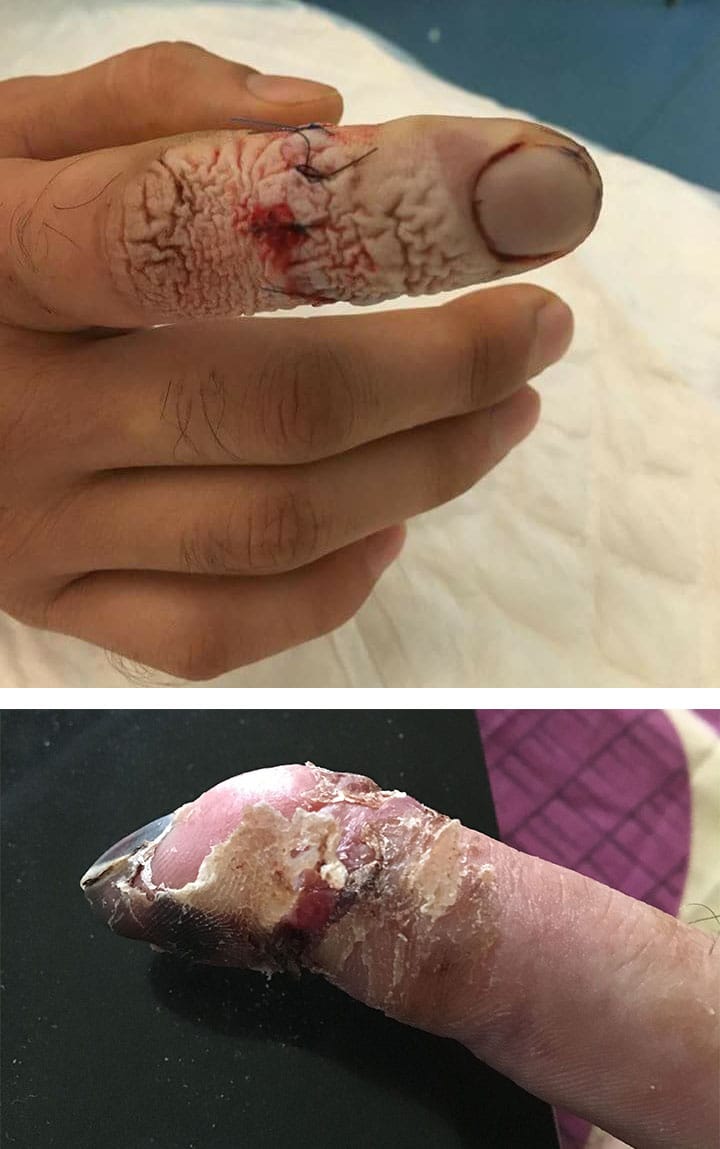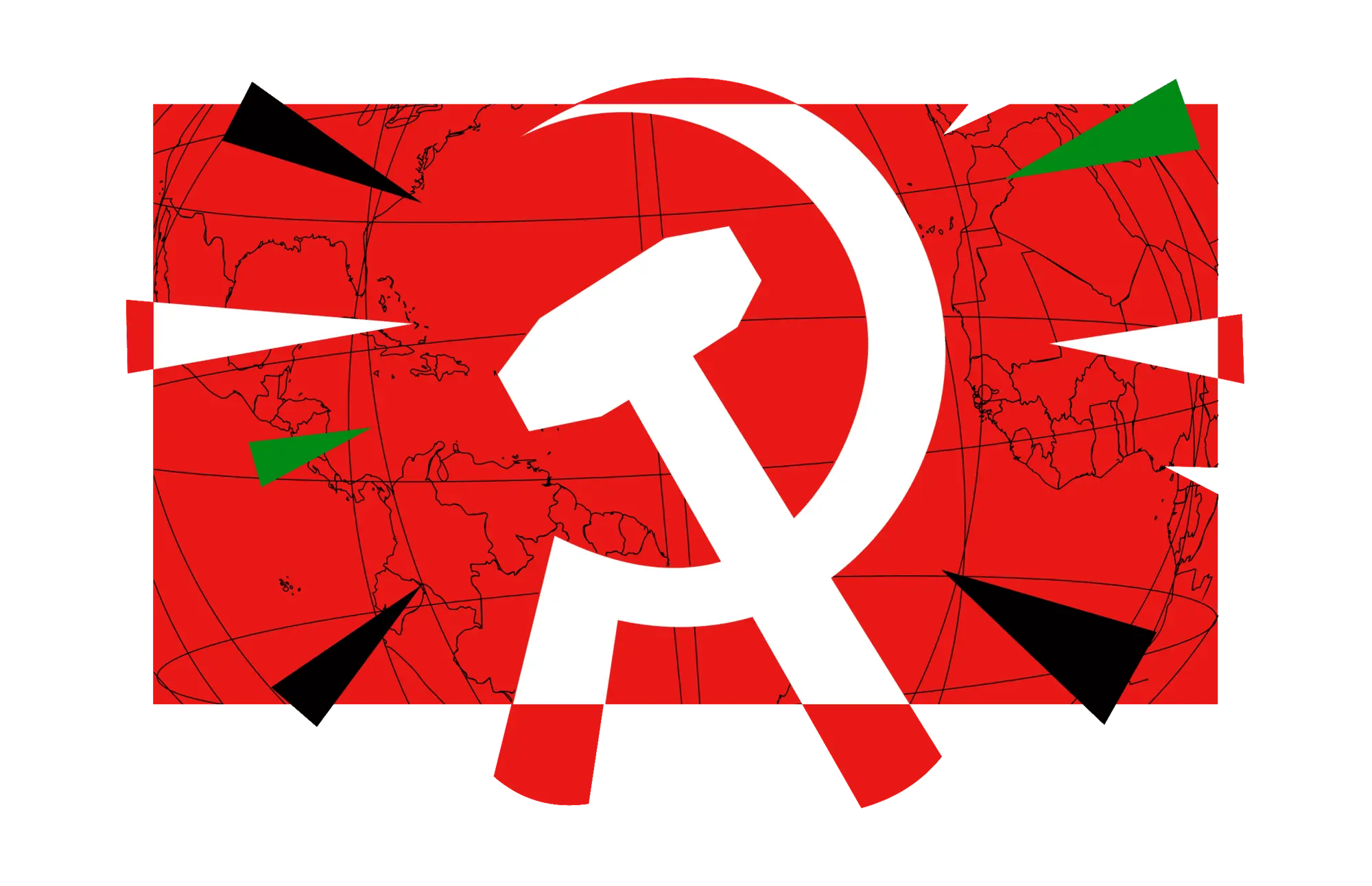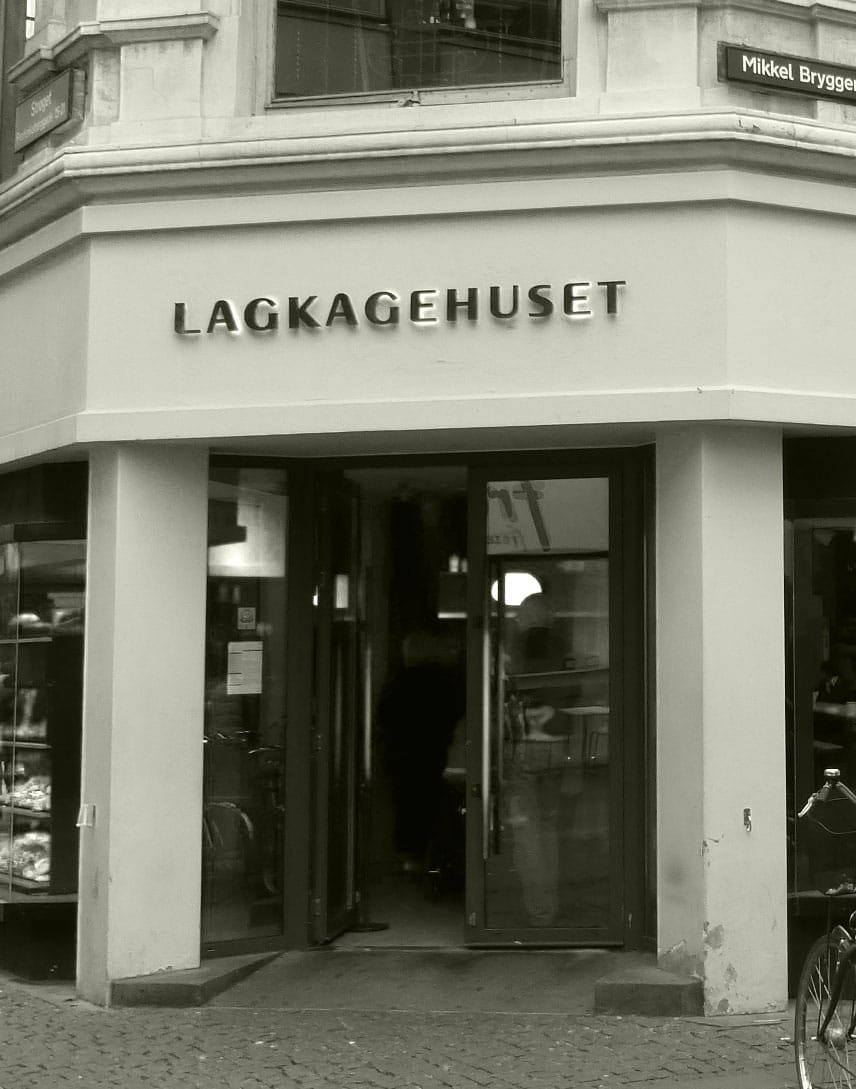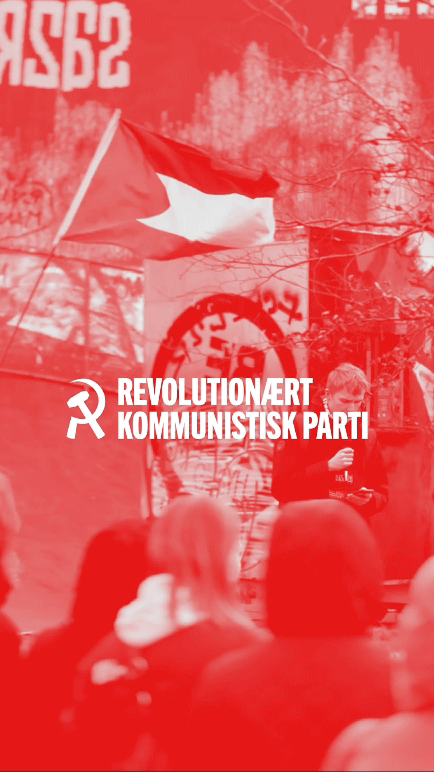[By REVOLT, the english magazine of Revolutionære Socialister – IMT in Denmark]
Lagkagehuset is known for its expensive and high quality products. But the reality behind the façade is anything but exclusive. For those employed at Lagkagehuset’s factory on Amerikavej, their reality consists of harsh employers, long workdays in gruelling heat and workdays without fixed working hours, overtime pay or even breaks. Arif will never forget the short time he spent at Lagkagehuset’s factory on Amerikavej. Not least because his right index finger is now severely deformed as a result of nearly being cut off by a dough cutting machine.
Two labour markets can be found in Denmark. The first labour market is one of somewhat regulated working conditions, some degree of organization and semi-civilized wages. In recent years, however, another has emerged in the shadows. This labour market is characterized by massive exploitation, fraud and desperation. Temporary employment agencies, small companies and subcontractors rule here. Denmark’s trade unions remain largely absent from this labour market, leaving the workers to their fate. If this is allowed to continue, it will have a ripple effect, and will also come to affect the more civilized parts of the labour market.
Last year Lagkagehuset’s owner FSN Capital was able to register an 80 percent increase in its profits, with the sum of 38,1 million kroner – a fine result indeed. And while the consumers enjoy their expensive products, the company is expanding to London. The company is, apparently, an example of the best of all capitalist worlds.
But the other side of the coin can be found in Lagkagehuset’s factory in Amerikavej in Copenhagen. This is where Arif worked.
Arif has been in Denmark since April 2015. He is one of the many Greencard workers who are highly educated, with degrees from Western universities. Arif holds a master’s degree in information systems from a Swedish University. Like many other Greencard workers he came to Denmark in order to use his education. It turned out, however, to be difficult to find a relevant job. To make the situation more difficult, there are very high requirements for Greencard workers, requirements which are constantly being tightened, for annual job incomes and so on. This means that Greencard workers are frequently forced into accepting the worst jobs with the poorest working conditions, and often several of these jobs simultaneously in order to avoid being deported and losing everything that they have invested. Through his unskilled work, Arif must receive a monthly salary of approximately 27,000 kroner in order to meet these requirements. This economic pressure is by no means an incentive for prioritizing good working conditions.
”During the training in the company I was told that ’if you want to work here, do not take breaks. Go to the toilet and do what you need to do from home.’ One of my colleagues went to the toilet twice a day and was fired. And so no one takes breaks, even though the heat from the ovens is suffocating.” Arif tells us, describing how there is no proper ventilation system in the factory.
”20-30 men work on each of the two shifts”, explains Arif. And it isn’t much Danish one hears at the machines. Arif estimates that approximately 20 percent of the unskilled workers are from Eastern Europe, while 60 percent of the workers are under the Greencard scheme. This is by no means a coincidence.
”The supply of labour is very high. When one person gets fired, 2-3 others turn up to fill the position. Many of these people will take anything at all in order to be able to comply with the requirements of the Greencard scheme. If a worker complains, he gets fired” says Arif, and points out that it is an easy matter for the employer to deal with ‘complainers’ or those who don’t work fast enough. “There is always a sword hanging over your head; you must document your monthly income to the authorities, and so one has to accept a lot” Arif explains.
Fixed salary – uncertain working hours
The salary is “according to the collective bargaining agreement” writes Lagkagehuset. When Arif was hired on the 8th April 2016, it was under a contract of 37 hours a week for a fixed monthly salary of just 20,000 kroner. This included the inconvenient work hours and weekend supplements, both of which were contractually fixed at 20 hours a month. Under the assumption that these working hours are correct, this would mean that the contract more or less just meets the minimum rates as put forward in the agreement between Danish Enterprise and NNF (The food workers union). However, the policy from the employers at the factory in Amerikavej is that one must stay until the work is completed. Overtime does not exist.
The pressure of the workload is, according to Arif, unbearable:
”I worked from 05:00 in the morning until the work was completed 8 to 10 hours later, 5 days a week. The boss was constantly on our backs. I have no problem with uninteresting or hard work; neither do I have a problem with a low wage. But if the boss is constantly after you, if you are under constant stress, then it just isn’t bearable… and that’s when accidents happen.”
Arif describes the working environment and the way in which the master bakers spoke to the unskilled workers as being degrading and very hard to stand.
“The boss’s eye was constantly on you. If one stood still while a machine was running, he’d be over you. There was no time to drink water or eat.”
The Accident
 Arif’s finger was almost chopped of and is now permanently damaged.Around noon on the 13th May this year, it all went terribly wrong. Arif had been told to clean the dough cutting machine that he usually worked with. He stopped the machine and started to clean it. But he was told by his boss that the machine could not be properly cleaned unless it was running. So Arif, stressed and tired, did as he was instructed to do. Residue dough did indeed come out from the two blades which cut the dough, when the machine was running. Arif tried to clean it up while he leaned over the large dough funnel. But then things went wrong. Arif’s right hand got caught between the two blades, one of which almost completely cut off his right index finger.
Arif’s finger was almost chopped of and is now permanently damaged.Around noon on the 13th May this year, it all went terribly wrong. Arif had been told to clean the dough cutting machine that he usually worked with. He stopped the machine and started to clean it. But he was told by his boss that the machine could not be properly cleaned unless it was running. So Arif, stressed and tired, did as he was instructed to do. Residue dough did indeed come out from the two blades which cut the dough, when the machine was running. Arif tried to clean it up while he leaned over the large dough funnel. But then things went wrong. Arif’s right hand got caught between the two blades, one of which almost completely cut off his right index finger.
Blood spurted from his finger and Arif was helped down from the machine by his colleagues. Ambulance and police arrived at the factory and shortly afterwards the Danish working environment authorities were called. They issued an immediate injunction which included that the on-job training should be supplemented with further training and stop-sensors should be installed on all four sides of the machine, rather than just the current one stop-sensor.
Arif came very close to losing his finger entirely. The first doctor to treat him and eventually sew his finger together at Gentofte Hospital initially believed it had to be amputated. But after a second opinion from Hvidovre Hospital’s orthopaedic department, Arifs finger was saved. Today, it sits in an awkward folded position in the outer joint. As a result, Arif has difficulties using a keyboard – a significant handicap when one is a master-graduate in information systems.
A few days after the accident a member of the administration from Lagkagehuset visited Arif at his home. Arif knew him well and had the distinct feeling that he had been sent by management. He tried to persuade Arif that it had been an unforeseeable accident and that it had probably been Arif’s own fault. He also explained that the company would probably fire him as an ‘injured horse’.
The healing process was complicated and the wound became infected. Only now, in mid-October, can Arif start to use his hands and resume working again. Throughout the entire period of sickness, he kept his boss informed of the doctors’ prognoses. During the first two months Arif received a salary and thereafter sickness benefits. But a few days ago he received a message that his employment was terminated due to ‘restructuring’. This ‘restructuring’ has not, however, prevented Lagkagehuset from searching for new employees for the factory in Amerikavej. The workplace injury authorities are still looking into the case.
The issue of safety is taken lightly at the factory in Amerikavej and this is furthermore reflected in the fact that, according to Arif, the workers are expected to drive a forklift without any prior training. Training is too expensive. A friend of Arif’s damaged a forklift, where after he was threatened with a 30,000 kroner deduction from his salary. He has now resigned.
Not a unique case
The working conditions in the factory in Amerikavej are tough. But according to Arif they are definitely not unique. During his first nine months in Denmark, Arif worked for the catering company Choice Convenience. Here the workday consisted of 10-12 hours, and he was constantly told that he wasn’t working fast enough. ‘You’re not sweating!’ he was told.
In fact, the conditions are often worse in smaller companies, which many Greencard holders must take positions of unskilled work in. The bigger companies, such as Lagkagehuset, which have signed collective bargaining agreements are obliged to at least cover holiday pay and the labour pension. But the collective bargaining agreements are not in themselves a guarantee.
Social dumping under the collective bargaining agreement
The collective bargaining agreements which the trade unions manage have now become so full of holes and exceptions that they do not provide real protection for the workers. It is easy enough to create social dumping within these agreements. The minimum wage agreement’s system was supposed to work the following way: The collective bargaining agreement guarantees a low minimum standard. This minimum level is the starting point for local negotiations between the workers and the employer at the company-level. In this way many trades have an average wage almost twice the minimum wage stated in their collective bargaining agreement. Lagkagehuset has signed such an agreement but pays many of their workers the bare minimum. The problem is that for the minimum wage system to work it requires a solid, local organization of the workers at the workplace with strong trade union representatives. But how many of such well-organized jobs are left? The new companies such as Lagkagehuset, which are growing, are very careful to quickly fire any ‘complainers’; essentially anyone who might oppose the employers and organize their colleagues. It is thought-provoking that conditions such as the ones Arif experienced can pretty much be approved under the NNF-agreement, not just in relation to the minimum pay which stands at 113.68 kroner an hour, but also in terms of working hours and breaks.
The agreements states in part:
“The daily working hours must not normally exceed nine hours.” And it continues; “A daily meal and rest break of at least a half hour should be provided. The time of the breaks can be arranged locally. The break may be waivered under agreement between the employer and employee.” (Own emphasis). This illustrates pure declarations of intent. The employer can just make an agreement with the employee;”if you want the job, then it is without breaks and under these conditions,” and so no breach in the agreement occurs.
Get out of the offices
The union leaders and officials often complain about how workers today just aren’t joining the unions, that “it isn’t like the old days” where work and trade union membership were inseparable elements in the workers everyday life. This was the case during the post-war boom where the trade unions as we know them today were consolidated. But why join a trade union today when there are so many holes in the collective bargaining agreements that they practically resembles a sieve?
The union leaders need to remember that there was a time when workers in Denmark were unorganized, a time when there was no tradition of being a member of a union and where employers could do as they pleased. These were the conditions that gave birth to the trade union movement. Through struggle and hard work, thousands of activists managed to build a strong trade union movement with semi-civilized salaries and working conditions. During the last generation or so, these standards of working conditions have been under constant attack.
If the union leaders are searching for answers on how to increase membership, then they should look back to the roots of the labour union movement and start making some changes rather than just sit around pushing papers and complain.
One of the major problems for the unions today is that the working conditions that Arif has described can, for the most part, not be combated through the legal system. Only through collective action can the roots of the problem be addressed.
While nationalistic, racist and xenophobic legislation is actively used by employers and the Danish bourgeoisie to divide the working class up in an internal struggle, the labour union leaders sit on their hands. The Greencard workers who are in the country should immediately be granted permanent citizenship. That would, in one stroke, remove the sword of Damocles that hangs above their heads and allow them to speak out about the inhuman working conditions they suffer under.
The Danish labour union leaders do not see, or perhaps refuse to see, that they are playing into the hands of the employers when they stand in opposition to Eastern European and other foreign workers. The Labour movement’s automatic reaction to the downward push of wages in the unorganized shadow labour market is to call on SKAT and the police. But we would rather pose the controversial question: what about instead trying to organize the workers? Also those who do not speak Danish or receive such low wages that they cannot afford union membership? Have the labour union leaders forgotten one of the working class’s very first slogans? Workers of the world unite!
Arif’s story is unfortunately just one of many. It is about time that the labour unions open their eyes and come back to reality. Nothing worth fighting for has ever come without a fight.
[Join us in the fight for a socialist transformation. Join Revolutionære Socialister. Contact: marxist@marxist.dk]






